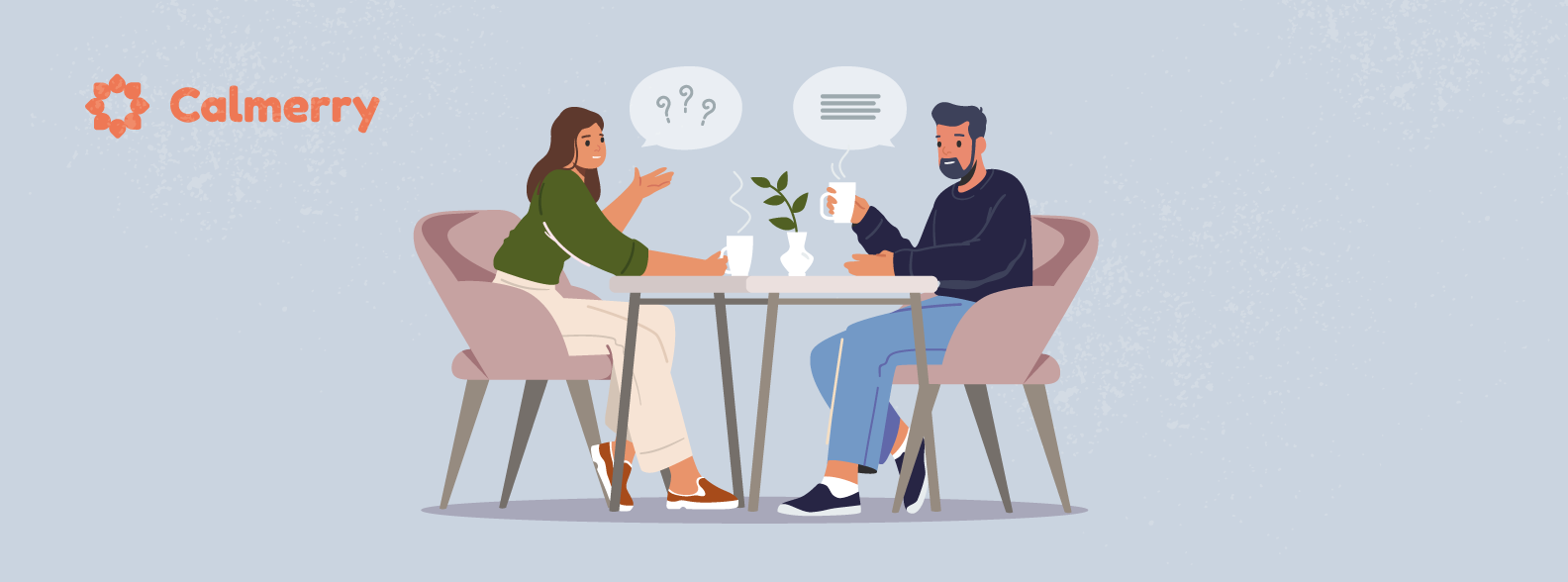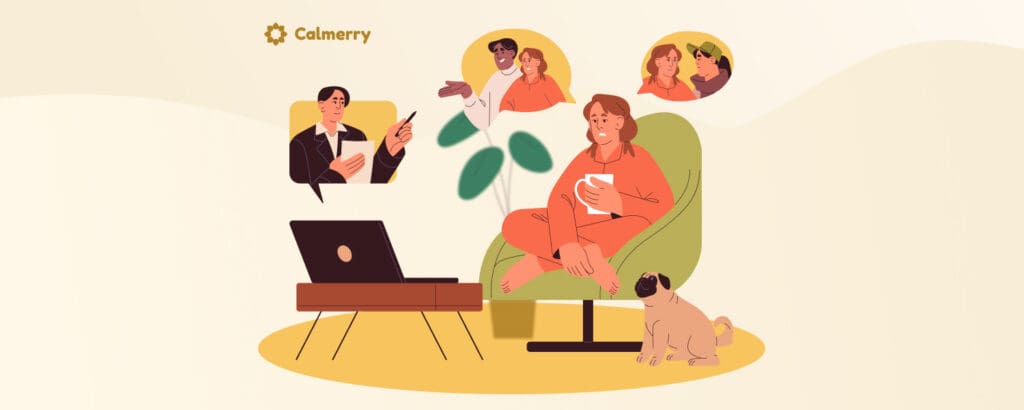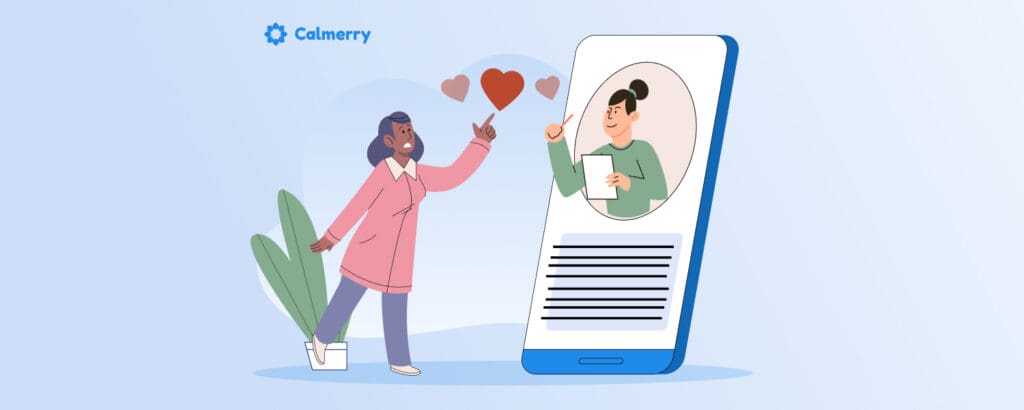What to Expect from Couples Counseling

In this article
You’ve been considering couples counseling for a while. Maybe you’ve even checked out some therapists in your area. You and your partner are ready, but not sure what to expect.
What’s it going to be like?
Will the therapist tell us the relationship is doomed?
Will I get blamed for everything?
Do I have to tell everything (even THAT thing)?
These are all normal questions partners have when faced with going to counseling. Making the decision to go to couples counseling isn’t easy. It comes with a lot of worries, emotions, and maybe even some fear. After all, you and your partner will be sharing some of the most intimate details of your relationship with someone who doesn’t know you.
If you’ve never been to counseling before, the whole process can seem mysterious and even confusing. Even if you’ve done your own personal counseling, you’ll find that counseling for couples is a little different.
To get the most out of your couples counseling experience, let’s take a closer look at what you and your partner can expect and how to prepare for couples counseling.
No-judgment zone
The fear of being judged or that the therapist will “take sides” and only believe your partner is one of the most common reasons people avoid couples counseling. Your therapist’s role is not to judge either of you. In a relationship, each of you brings both positive, constructive behaviors and some negative or unhelpful behaviors. You each contribute to both the dysfunction and the success of the relationship.
Your couples therapist is a mental health professional trained to help you both explore problematic behaviors and patterns of interaction that affect the health of your relationship. Your therapist may point out certain patterns that you might want to consider exploring further and possibly changing. The intention is not to shame or blame. Only by becoming aware of and acknowledging a problem can you begin to make positive changes.
The first sessions
In your first session or two, you and your couples therapist will be getting to know each other. You will probably have completed some paperwork prior to your session. Part of your session will likely include your therapist:
- Reviewing paperwork and policies
- Explaining what you can expect from counseling
- Explaining the limits of confidentiality
- Identifying what to do if you have an emergency between sessions
This is also a great time to ask any questions you have.
Expect that there will be a lot of questions about your relationship and the issues that bring you to counseling. Some questions might be easy to answer. Others may take some thought. It’s ok to say that you’re not sure if you’re really not sure.

Be mindful of avoiding topics because they are uncomfortable, though. Your therapist needs to understand what’s happening between the two of you and will rely on each of you to share your perspectives and experiences. It’s important to be honest and sincere in the effort you put into the sessions. The information you each share will help your therapist work with you to achieve some goals as a couple and a plan to reach them. This plan will guide the process as you work towards your goals.
Focus on the couple
Unlike individual counseling, where the focus is on one person, the focus in couples counseling is on the relationship dynamics between you and your partner. Your therapist will guide you through the process of learning to express your feelings and needs in healthy ways that may be new for you. You’ll learn to communicate so that you are able to really hear and understand each other, learning to discuss issues and solve problems together.
You will generally meet together with the therapist. Occasionally, the therapist may need to meet with you or your partner separately to clarify or address a specific issue. It’s not uncommon and is done with your knowledge.
Sometimes, in the course of couples counseling, a person reveals something that may not be appropriate for or hamper progress in couples counseling (e.g., a mental health issue or an active addiction). If that happens, your therapist will make an appropriate recommendation for individual care. It doesn’t mean that couples counseling has failed or that you can’t work on the relationship. It means that sometimes, you have to do your own healing work so that you can better work together as a couple.
Expect surprises
Expect to be surprised, maybe even upset, by some of the things your partner says. Even the most compatible couples will not perceive or agree on everything in the same way. It may be hard to hear what your partner really thinks. Allow yourself to be open to hearing your partner’s views and try to listen to understand where they’re coming from. You don’t have to agree, but understanding is the first step in learning a healthier style of communication.

Don’t be surprised if things get a little heated. You may be talking about some painful, unresolved issues that you’ve avoided or even been at odds over before. The resolution isn’t always smooth. Rest assured that your therapist knows how to help you navigate these topics in a safe, supportive way. Sessions are NOT opportunities for yelling at or berating each other.
Your therapist will set boundaries and help you learn to navigate conflicts in healthy ways so that you can resolve conflicts and find solutions that work for you. Part of the couples counseling process is learning to handle emotions in constructive, loving, and respectful ways.
Expect feedback
As your therapist guides you through the process, expect feedback – a lot of feedback. Feedback is a way to gain insight into your relationship and each of your contributions to its successes and struggles. We can’t always be objective about our own actions and relationships because we are emotionally too close.
Your therapist will ask hard questions that prompt you to really think about your relationship and the role you play in its state of functioning. They will offer practical, honest feedback to each of you. It won’t always be 50/50 and sometimes might even not seem “fair”.
Your therapist isn’t picking on you. Their role is not to take sides, although it can sometimes feel that way when you’re on the receiving end of feedback. Feedback is meant for your thoughtful consideration. What you do with it is up to you.
Homework
Talking about things in your therapy sessions is great, but it isn’t magic. You’re learning about new ways of interacting, but what happens when you leave the counseling space is where the real learning happens.
During your sessions, you and your partner will be learning new skills and ways of interacting. Learning how to use those skills on your own is part of the process too. Your therapist will probably give you some homework assignments to practice skills that you’ve learned in the session. We learn by doing, and homework gives you both a chance to practice the new skills you’re learning. When you return to the session, you can share your struggles and your successes with your therapist.
When to seek couples counseling
Knowing when to seek help isn’t always clear. How bad do things have to get? Do you wait until you’re at an impasse? Sometimes the challenges you’re facing can seem unsurmountable. When is it time to seek the help of a professional?
The short answer to the question of “when” is sooner rather than later and before things are beyond repair. What that means for each couple will vary quite a lot, though.

According to relationship expert Dr. John Gottman of the Gottman Institute, couples spend an average of six years struggling with their relationship issues before seeking help. That’s a long time to be unhappy, and your intimate, emotional connection can really suffer in that time.
In fact, research tells us that couples who seek help sooner tend to have more successful outcomes than couples who wait until things really break down.
Couples decide to come to counseling for lots of reasons. Some couples need help resolving small but recurring issues. Others seek couples counseling to learn ways to communicate in healthy ways. Still, others find themselves at a crossroads and need help finding their way back to each other.
Just a few of the many issues that might bring a couple to counseling include:
- Poor communication
- Emotional or physical intimacy issues
- Differences in parenting
- Family conflicts
- Anger issues
- Infidelity
- Enrichment – yes, some couples seek counseling to maintain and enhance their marriage to keep it in a healthy space
Today, starting counseling is easier than ever. You can see someone in an office setting, or you can access couples counseling online in a way that fits your schedule. Online couples counseling is effective, affordable, and has the added benefit of being able to schedule sessions at times most convenient for both you and your partner.
In fact, online therapy has become the preferred way of engaging in therapy for millions of people, especially since the pandemic. You can work with your therapist from the comfort of your home, and you and your partner can do it together.
Sometimes what feels hopeless is absolutely fixable when both partners are willing to do the work. Before you assume it’s too late, give your relationship a chance for healing and growth. Let a trained couples counselor help you see what’s possible.
online therapy
live video session


